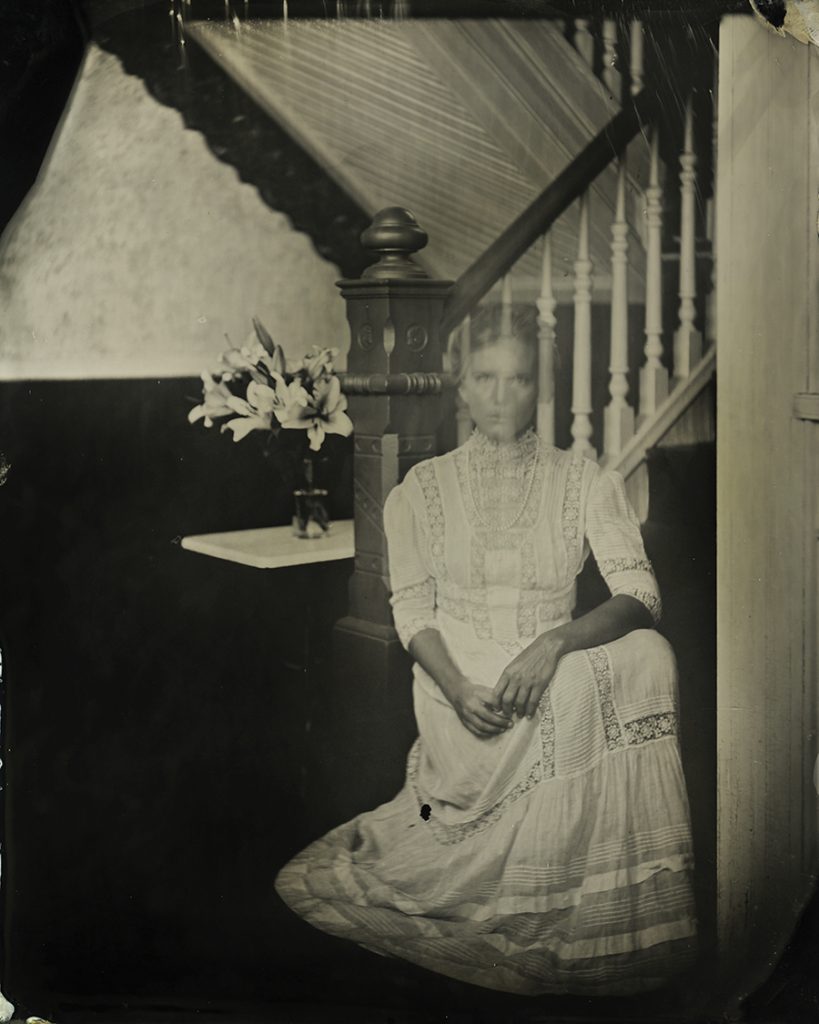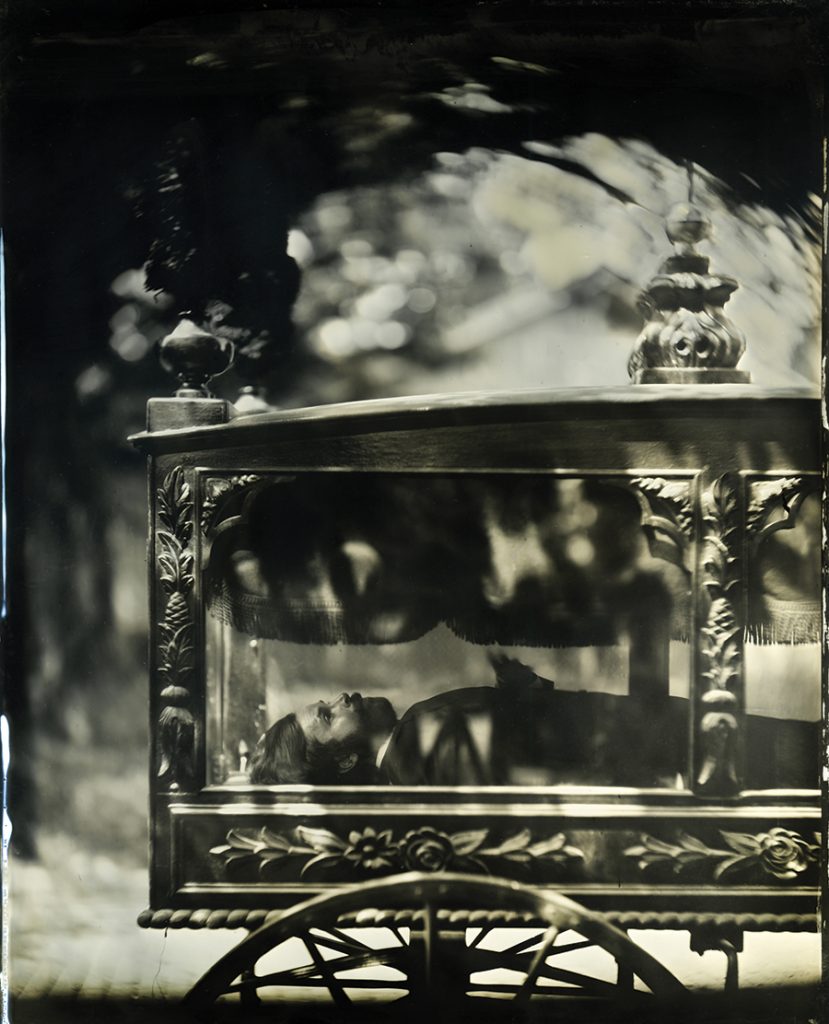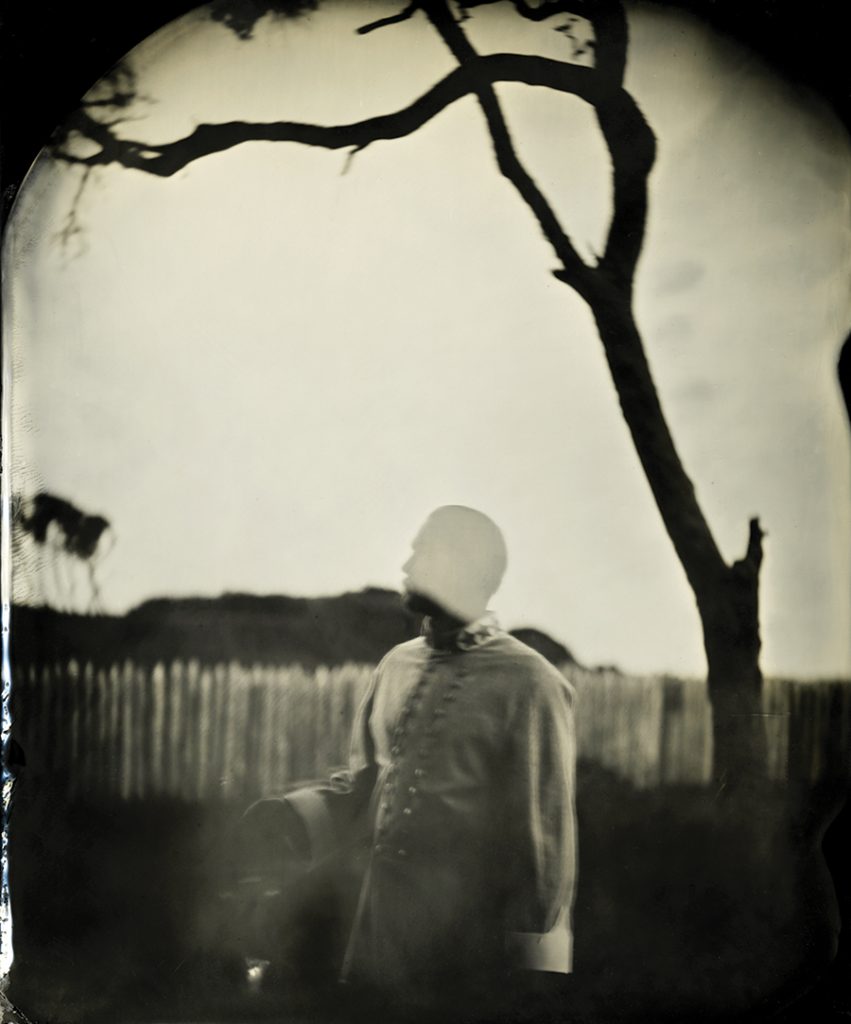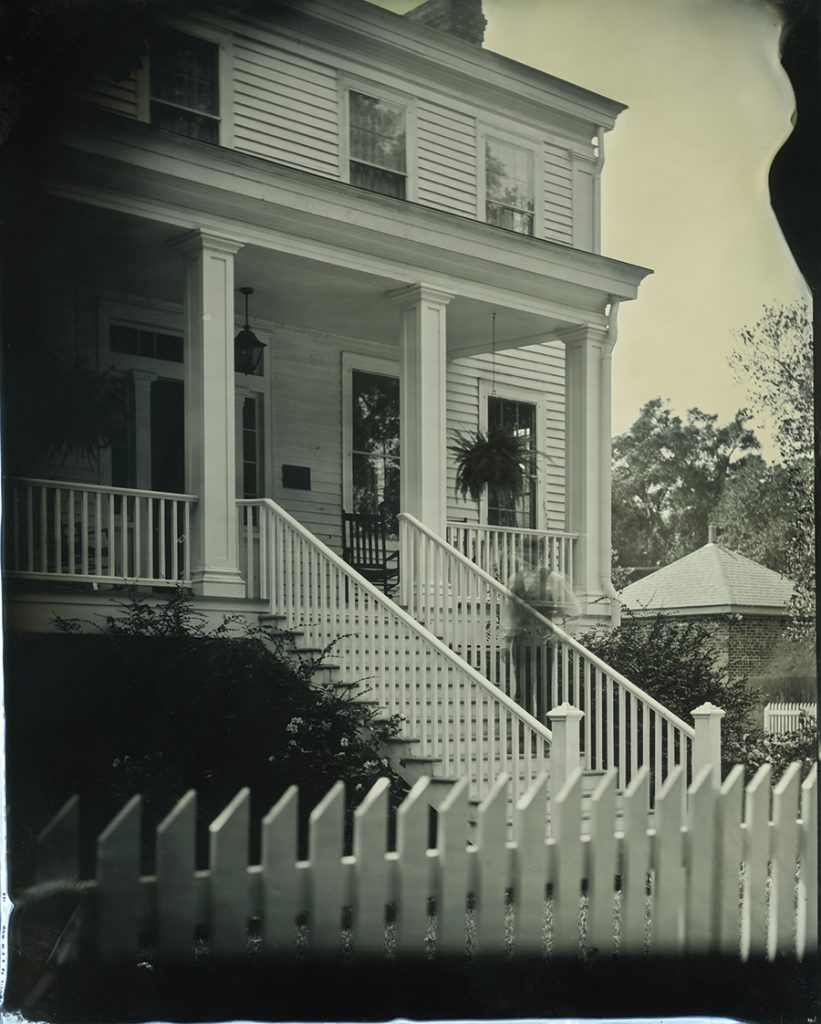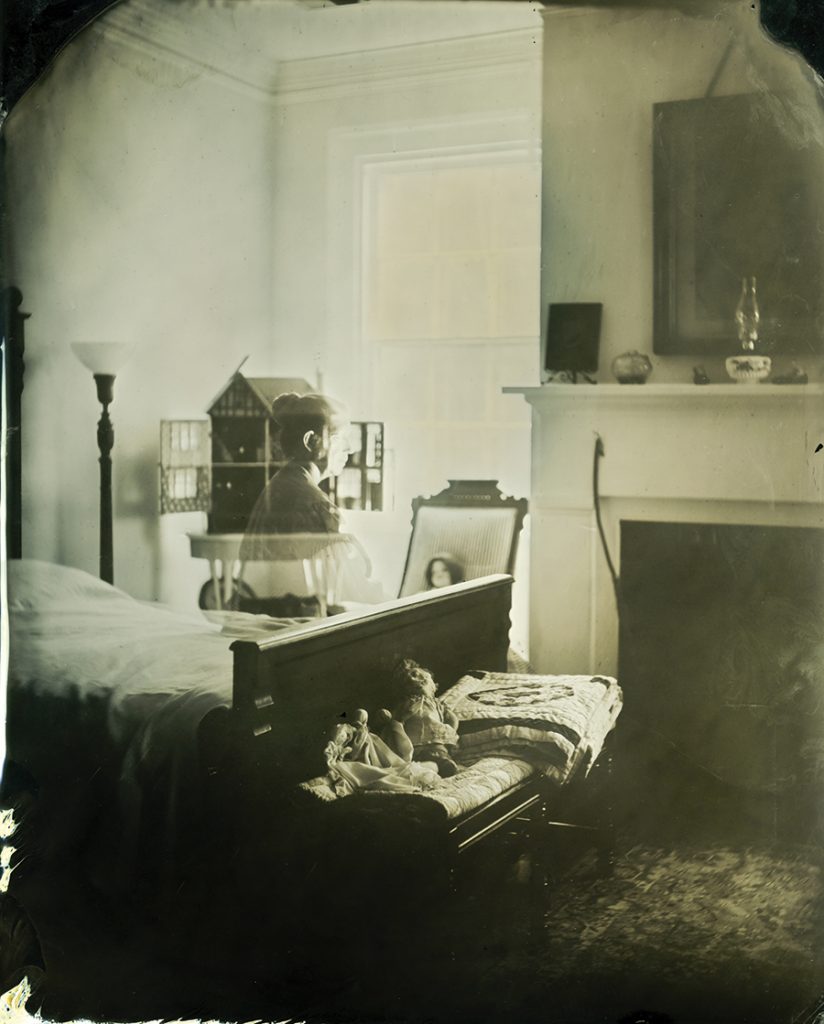“The boundaries which divide Life from Death are at best shadowy and vague. Who shall say where the one ends, and where the other begins?” — Edgar Allan Poe
Tintype Photographs by Harry Taylor
Wilmington is a city of ghosts. Floating down the cobbled streets of downtown, mistaken for a small and sudden autumn breeze. A glint of a face in the upstairs window of an old Queen Anne — the trickery of lace curtains. If you don’t believe your eyes, you may believe your ears: Phantom footfalls, distant voices, creaks and groans of floors, doors and gates make for moments of private panic. Much mythology proclaims spirits are unable to cross water, making the “V” of the river and the ocean, which shapes our city, a veritable ghost trap.
Just as active than the ghosts themselves are the ghost stories of Wilmington. Though, beware, telling a ghost story is what activates the ghosts themselves. Who doesn’t like a little attention? It’s only natural to gravitate toward someone saying (or reading) your name.
Our writers chose five of the most famous Wilmington ghosts to channel into new tellings of the old legends. Folklore is passed down in many ways — poems, ballads, plays and narratives. We recommend reading by firelight. Perhaps aloud. Never alone.
With that in mind, we offer you an incantation for Emma Baldwin, wife of a dentist and shrewd judge of character (and purity) who, as the legend goes, inhabits her home on South 4th Street to this day, offering a dime to those she likes and a tooth to those she doesn’t. A traditionalist, Emma is rumored to disapprove of unwed couples. For a true Southern busybody, one’s work is never complete, even in the afterlife.
Across the street from Emma, and predating her death by 100 years, dwells Samuel Jocelyn, whom Colonial medicine failed, burying him alive in St. James Cemetery after a fall from his horse rendered him — to all appearances — to be dead. Later, in Victorian times, a bell tied to the dead man’s finger could alert a gravedigger poised to listen to the life still stirring in him. Samuel, a budding spiritualist, in lieu of a bell, took to telepathy (or haunting) and, as the story goes, appeared to his best friend Alexander Hostler in the night, begging to be dug up. Tormented, Alexander did disinter his friend to find him turned over in his coffin, his fingers raw from scratching the lid, asphyxiated. Samuel’s restless spirit is thought to haunt his early grave. Listen at the gate of St. James for the sounds of scratches. Our writer imagines what Samuel experienced that night he woke up . . . in a box.
Fort Fisher, the Confederate fort just south of Kure Beach, once a stronghold then the site of one of the bloodiest battles of the Civil War, unsettles the bravest of spirit-seekers come nightfall. The ghost of Maj. Gen. William H.C. Whiting with his distinctive mustache and starred coat frequents the mounds he helped build, though soldiers have been heard and spotted, as well. Why does Whiting linger? He predicted the slaughter at Fort Fisher. His requests for support were ignored, and after three bloody days in January 1865, the fort fell. Wounded, Whiting was captured and held as a prisoner in New York for months before his death. His spirit longed to return home, and many years later his wife, Katherine, relented and relocated his bones to Oakdale Cemetery in Wilmington — which he may well also haunt — but his soul belongs to the fort and his men. Our writer visited Fort Fisher on a black night and put pen to page to give voice to Gen. Whiting.
Just north of town, Poplar Grove, the historic peanut plantation, has a host of ghosts in both the main house and the tenant farmhouses. One’s family homestead proves a powerful magnet death cannot dim. Our writer pens the two tales on the most active members. The hubris of young David Foy, first-born son, echoes as a tangible energy in the house. Rebelling against his Unionist father, David joined the Confederate Army, but quickly died from typhus back at home, where, by many accounts, he still remains, bitterly stomping around the front office where plantation business was once conducted.
Nora Foy, the wife of David’s brother J.T., may well have been haunted during her life. A tough woman, she bore four children who all died within their first days of life. She went on to be a postmaster — carrying a small pistol — and raised her nephew to inherit the plantation since her bloodline was halted. Nora is rumored to dwell in the children’s bedroom upstairs, a benevolent, but protective force. Perhaps, in some netherworld, she is able to raise her babies, protecting them from what her Gullah Geechee maids may have called “haints” or “boo-hags,” the evil pests of ghostly realms one also must be weary of in the haunted South.
Special Thanks: Poplar Grove Plantation, Springbrook Farms and Horsedrawn Tours, Hannah Elizabeth Smith, David Ray, Deb Furer, and the Ghost Walk of Old Wilmington.
Harry Taylor’s ghost photographs are actually tintypes, a 19th-century wet plate collodion process with a direct positive image is made on a thin sheet of metal. Similar to daguerreotypes on silver, or ambrotypes on glass, tintypes were shot and developed in a studio or on site at Civil War-era fairs. Perfecting this medium for over ten years, Taylor travels with antique cameras and a mini photo lab in the back of his truck. Each tintype feels like a silent film, offering a transparency and movement lost to the instant digital world. Info: See Taylor’s tintype show, “Between the Air and the Ether” through November 13 at the Burgwin-Wright House, 224 Market St, Wilmington. Get your portrait made in tintype Friday and Saturday, October 21 & 22nd, 9 a.m. – 5 p.m. www.harrytaylorphoto.com.
The Incantation of Emma Baldwin
b. 1845–1909
By Nicholas Gray
Ping!— or patter —
Doth it matter?
Why, yes! — if you believe the chatter —
The coin will ping! — the teeth shall patter —
So, tell the story — how it goes —
So, tell the story, and you will know —
Emma Mitchell — was the daughter
Of a father loved and honored.
Emma then became the wife
Of a Baldwin man whose mouth she liked
Because the mouths he worked so much
Were just the mouths that kept her plus.
But then one day —
One tooth too much —
Her body-soul had seen — too much —
That honest day — 1909 —
Of natural causes she did die.
And so, next day, without a sound,
Her grave was dug down pound for pound.
Emma, Emma! — is the ghost
Whom we have come to trust the most
Because she guides us toward the truth
And judges rightly — charm’d or uncouth?
If you be a person good,
A ping! will chime upon our wood,
And show the face of Franklin R.
To tell us what your values are.
If you be a person best,
Ping! — ping! — ping! — a treasure chest!
But if you be a person bad,
The patter of a tooth will land,
A rotten, yellowed, dark display
To tell us of your deep decay.
On banister or window sill,
Mouthful of teeth will come to fill.
A dime is worth but mere ten cents
Until she shows us her sixth sense
Head up, no shine, don’t ever spend it.
Be pleased Emma has found you splendid.
A tooth is worth much more than that,
More than your suit,
More than your hat,
Because it’s told us that you’re scat,
And scat doth stink
Whereev’ you’re at.
Clawing at the Ether
The Last Regrets of Samuel Jocelyn
b. 1787—1810
By Nicholas Gray
[Lights up reveal a man on stage alone. His eyes open.]
SAMUEL: How now, have I come here — into this box? Sense, there is none. It is a coffin, shut with nails, top’d with mud. [He begins to panic]
Whoa, now! — Samuel — slow down your breath. Woe! Evermore, I talked too much, I thought too much. Surely some gravedigger hears my howl! Or you, Alexander. We were Jonathan and David, from the book of my namesake. Recall our passions — for the unknown — we did oath whoever left first to tread the Great Beyond did promise to return to truth-tell from the other side.
Xandy, I fear I fail this oath, for I know not rightly if, presently, I live or die. So, is Death . . . to doubt oneself? Or is it such exactly thus: Though blood stills, my mind remains? Nay! — damn my doubt. Surely the tatter of my burial dress — my desperate fingers scratching to the bone — this hideous moment, is no illusion.
My father, with his lieutenant, gavel-pounded to send me six under — you should have cried, “Nay! I see life in him!” Recall! We were near conjoined. Were that indeed the case, I could use an organ now, one extra breath, one heartbeat might save me. Recall our charm with cards and dice, when paired together, our purse ever doubled. Recall the only thing we cussed on — my horse, you despised riding.
Upon my steed, madly did I ride. Why? oh, Why! Why? Oh Why! Ah, Mary Ann. We had a spat — not the first — but you know that, eight months of married un-bliss. Recall that cold night, I rode off into the swamp. Something did spook my steady steed. Twas it dumb stump? A dumb snake — the rattle of a canebrake?
Ah!, now one thing does rise to me’mry. Memory! — you trial’d witch, was it you who threw me? As my corpse submerged, pulse submitting to the freeze, another witch did appear — she stole me elsewhere, swamp water becoming the River Styx. I begged to be heard. I clawed at the ether. She granted me return, but only to this pale resting place.
Am I now just desperately mad? ’Cause now Death doth take my last breath. My strength crushed by this coffin lid — I budge it nil. I have three words for you, my Xandy. But breath escapes. Please . . . dig me up.
[Lights out]
Nicholas Gray is the playwright of another ghost story,
“The Dying Words of Edison Strange.”
Falling Place
The Lament of Major General William H.C. Whiting, C.S.A.
b. 1824–1865
By John Wolfe
One black night at Fort Fisher, under the gnarled skeletal limbs of the live oak, I sat down to listen. I heard the whispers of wind in the grass and the mournful monotony of cicadas and I could just make out a muttering man’s voice:
“Now I return to my falling-place. Curse that January day when the warships plagued the horizon like swarms of black flies and the humid air was choked with smoke and the screams of my men dying in the marsh.
To me, my fate was no surprise; I knew when I first greeted Colonel Lamb at Fisher’s gates. His face grew grey when I told him we were to be sacrificed. How fitting for a lamb. But that we would be abandoned by our own — overwhelmed at the river’s mouth by the near-whole of the Union navy — how could I have known that? You malaria-riddled bastard, Bragg! The best Confederate general the Union army ever had. So close — so close! He ordered his men to sit on their muskets at Sugarloaf. And that meddling politician Davis ignored me to the last.
Bullets fell me as I grappled with the bearer of the Union flag. Bullets laid me supine in the sand when I refused surrender.
Blood! Blood was spilled upon this sand.
Cactus spines impaled our flesh.
Bones decayed in the needlegrass.
The mosquitoes who gorged on lifeless blood in their tireless pursuit of the living essence. Their descendants remember. I cannot forget nineteen hundred brave boys — Carolinians all — now a blurred mirage on this inhospitable spit of sand, this desolate end of the earth surrounded by the turquoise sea from which Death arrived, on white ships, wearing blue. Where are you now, my boys?
We are all lambs now. War, the great equalizer. Death, the greatest equalizer of all. The ghosts of brave men roam, lost. At least I have my dear Katherine. We rest, together at last, at Oakdale in the shade of a magnolia whose rotted blossoms blanket our bed. A mottled granite shield marks our bones.
But rest I can’t. I am doomed to guard this windy shore, eyes cast forever to the North.
But — who is this? Hallo! Who intrudes on these black grounds? Another of my lost lambs or a damn Yankee? Closer now and let me see the color of your coat.”
John Wolfe is a North Carolina essayist and spinner of local lore.
Homecoming
David Hiram Foy b. 1840–1862
By Nan Graham
Tramp
. . . tramp . . . tramp . . . the mysterious sound of heavy boots trudging slowly over wide plank floors echoes in the room. A low, moaning voice calls “David . . . Daaa-vid.” A feeling of phantom hands tightening slowly around one’s throat. Guests, docents and staff have reported these ghostly encounters at Poplar Grove Plantation. Don’t all respectable Southern plantations have at least one resident ghost?
***
David Foy could never envision himself running Poplar Grove, the peanut and sweet potato plantation that he, as first-born, was destined to do. The 21-year-old son, University of North Carolina class of 1861, AB diploma in hand, rode his dapple gray home for his father’s funeral with the last letter he received from him tucked in his coat pocket. The letter’s closing words read, “Union forever!” David thought of his father hunched under the oil lamp, shuffling through endless paperwork.
Tensions were high. David defied his father’s wishes, engaged a local man to oversee Poplar Grove and left to join his classmates in the Confederate cavalry. The frenzy of youthful enlistment-fever had David, and so many other testosterone-driven young men, in its grips. He believed it his duty to serve his South in the “Great Adventure.” A slim, hot-tempered man, David Foy cut a dashing figure astride his horse, as he galloped off to the training camp outside Wilmington.
The road to glory was not to be.
Struck down by typhus in the spring of 1862, only three months and five days after he joined the Confederate camp — where he likely contracted the insect-borne illness — David never saw a battle, much less combat. He returned home to to recuperate from the merciless disease, nursed by his ailing mother on a cot in the back parlor, only steps across from the despised plantation office that haunted him. Poplar Grove . . . the life he wanted so desperately to escape.
For weeks he lingered, plagued by chills, fever and unable to eat more than spoonfuls of broth. His cot was moved to the window parlor in hopes the lush herb garden and bustling stable workers would inspire him to recover. At dusk on a humid June evening, the young man breathed his last.
David, perhaps feeling cheated of his military dream and victory for his cause, still roams the family home. His chilling presence seems especially to lurk around the office where plantation business was handled for 75 years.
Tramp . . . tramp . . . tramp . . . of David’s boots as he stomps to the office. Can the disillusioned first-born, trapped by duty, be trying to leave Poplar Grove once and for all? Communicating with strangers his longing for adventure outside the routine of the fields and crops and slaves? It is his Papa’s voice calling him home, his dying words ringing out, “Daaa…vid, Daaa-vid” that some have heard?
All I can tell you is that recent paranormal experts tested the office and reported that the sensitive needle on the K-II Electro-Magnetic Field Detector moves from the normal yellow scale in the half-moon meter to the far-right, in the red.
Ghosts? Maybe. Something? Definitely.
The Blue Door
Sarah Eleanora (Nora) Dozier Foy b. 1850–1923
By Nan Graham
The
low soft voice settled over the room like the evening dark.
“We Papa een heaben,
Leh ebrybody hona you nyame
Cause you da holy.
Juba knelt by Nora’s beside, praying. She glanced at the restless mother-to-be and saw she was finally drifting into sleep. She loved this ailing woman and barely felt the discomfort of another late night. Hands folded in prayer, she continued in her Gullah language. She knew The Lord’s Prayer in English, too. It felt more powerful in the strange patois she had heard since babyhood:
“. . . Leh we don’t hab haad test when Satan try we. Keep we from e ebil. Amen.”
Juba rose and sat in the rocking chair near the window in the nursery. The chair that had held so many mothers and little ones for the last three generations. She watched the sleeping woman with her mountainous belly.
Poor Nora Dozier Foy, mistress of the Poplar Grove Plantation, was nearing her “borning time,” the fourth birth in nine years. First a girl, then two baby boys . . . all born with howling voices that seemed to predict robust infants. Then mysteriously . . . within hours . . . silent and still. Nora’s husband J.T. had a bed moved into the nursery as a good omen.
As a precaution, Juba put the broom by the head of the bed. One Gullah apparition, the dreaded Boo Hag, was known to crouch on the sleeper’s chest to steal his skin, causing him restless nights. Much as cats were rumored to suck the breath out of a sleeping baby, the Boo Hag could suck the life out of the sleeper. A compulsive creature, the Boo Hag is compelled to count every single straw in a broom or hole in a sieve. For extra measure, Juba tucked a carefully folded piece of newspaper into the toe of Miz Nora’s shoe. Similarly, “haints” were obliged to stop and read single every word. The process took so long, (the meticulous haints were notoriously slow counters and readers) it would be dawn before the counts were completed. At daylight, the unsuccessful Boo Hag would vanish to find another skin to inhabit.
Nora took Juba’s advice and convinced J.T. to paint the back door, the porch ceiling and nursery windowsills light blue. “Cause that color will guarantee a boy child,” Juba promised. She never mentioned the real reason. Every Gullah knows evil spirits will never cross water, so windows, doors and ceilings painted sky or indigo color would surely fool the demons.
Baby boy Foy, after twenty six hours of agonizing labor, lived only three hours before he lost his breath.
“My Ebo!” Juba chanted over and over, holding the now still baby. Ebo means “Little One” in English. Nora’s grief was overwhelming, she would not have another pregnancy. Later, she would adopt and raise her nephew to be their heir.
At Poplar Grove Plantation, the children’s room is inhabited by at least one maternal presence. If you walk up softly, you may see that the rocking chair by the window rocking slowly back and forth, back and forth with a low rhythmic creak.
Nan Graham, local NPR commentator since 1995, is a long-time admirer of ghost stories and believer in haints. Her front door is painted Gullah Blue.

